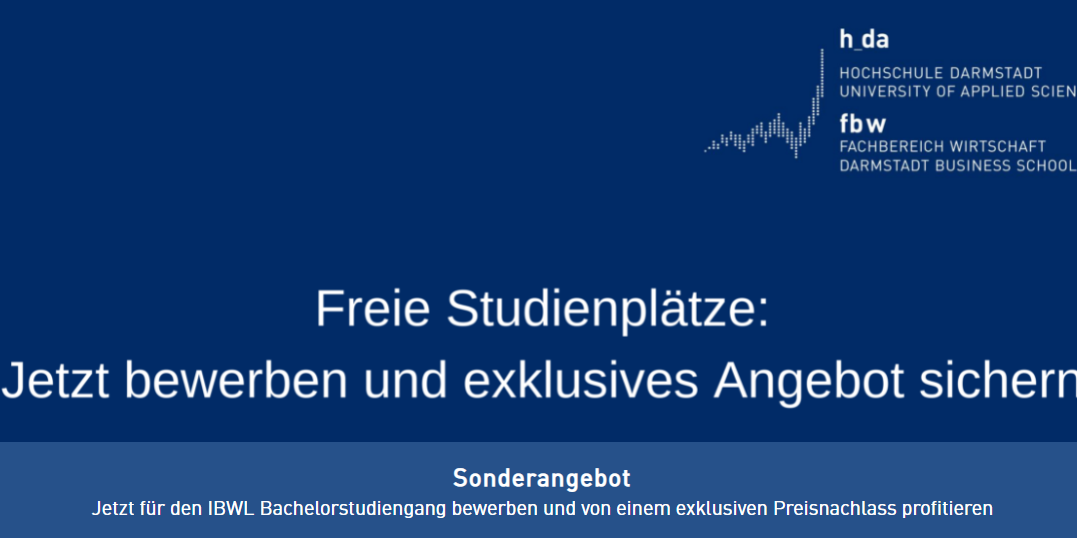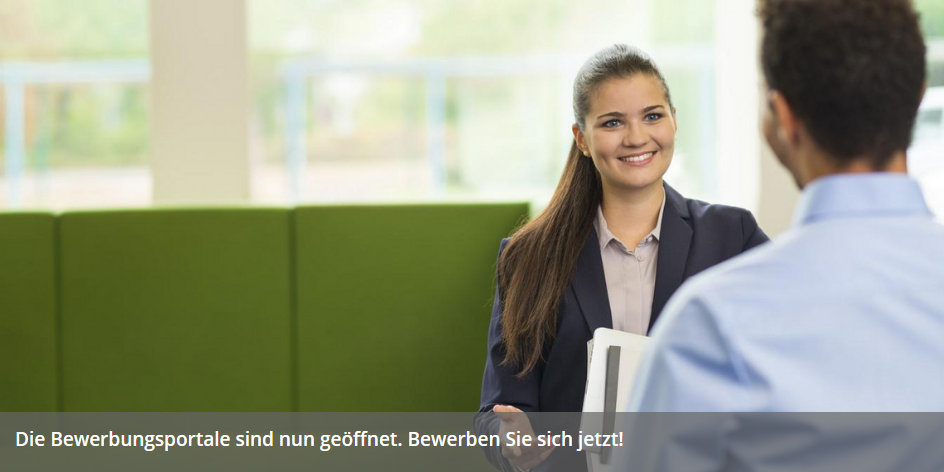Bachelor
1. Welcome to the IBWL Bachelor
- Do you value a well-founded study course, but at the same time you would like to gain valuable practical experience in a company?
- Are you interested in business processes and entrepreneurial matters?
- Would you like to combine your studies and professional activities in an optimal way?
Then the part-time or dual study programme in International Business Administration (B.Sc.) at Darmstadt Business School of Darmstadt University of Applied Sciences is the right choice for you!
The Bachelor's programme combines a sound academic education with corporate practice
The Bachelor's programme combines academic education with business practice. IBWL students study at the university and work in the company at the same time. How does this work? We have developed an innovative time model that allows students to work in the company and study outside of core working hours. In this way, we ensure that the study programme fully meets the requirements of an academic university degree and that high-quality work can be done in the company at the same time. Find out more on our website and visit our next Infosession.
We look forward to seeing you!
Prof. Dr. Benjamin Engelstätter
Head of study programme
2. Your advantages at a glance
Darmstadt Business School at Darmstadt University of Applied Sciences (h_da) offers attractive degree programmes that combine current research, academic teaching and practice in an innovative way. The IBWL Bachelor's programme enables you to gain practical work experience while studying for a Bachelor of Science degree. Our figures speak for themselves: more than 450 graduates have now successfully completed the IBWL programme. Currently, we count more than 200 participants who study in the IBWL dual programme or alongside their jobs. Benefit from our experience and the advantages of the programme and lay the foundation for your successful study and professional career with IBWL.
3. Study contents: Building blocks for the future
The IBWL degree programme offers a generalist business education with an international orientation. The curriculum is oriented towards the requirements of future-oriented organisations and prepares you for the labour market of tomorrow.
As a graduate, you will be able to apply the specialist knowledge required for international professional practice. This applies in particular to the areas of:
- Organisation and management
- Human resource management and leadership
- Procurement and logistics
- Marketing and sales
- Digitalisation, IT management and data analysis
- Accounting, investment and financing
- Controlling and financial management
with special consideration of the interaction of international partner companies as well as globally distributed customers, but also state institutions. The independently developed solutions enable decision-oriented business management in a global context and in responsibility towards society and the environment. The social, foreign-language and intercultural skills acquired during the degree programme in addition to the specialised knowledge provide particular support.
Would you like to know more? Here you will find the module overview for an overview of all study contents. In the module handbook you can then see exactly what you will learn in which module - and how.
→ Module overview part-time
→ Module overview dual
→ Module handbook part-time
→ Module handbook dual
4. Part-time or Dual
Would you like to continue your education at university level, obtain a Bachelor's degree and continue working full-time? Then the Bachelor "International Business Administration" (IBWL) is a good choice in any case!
The programme is offered in a dual and part-time form of study. The majority of the courses are taken jointly by dual and part-time students, but the variants differ significantly in how strongly your company is involved in the study programme.
Find out more about the differences between the dual and part-time variants on our subpage!
→ Part-time or Dual
5. Internationality
The concept for the Bachelor's degree programme in International Business Administration is practice-oriented and geared towards a broad range of activities in a predominantly international environment. The degree programme qualifies you for entry-level management positions. The international orientation of the programme opens up very good and attractive opportunities on the labour market.
You will develop and expand your international competence in courses with international content, by learning two foreign business languages, in two modules on business, culture and society, and by working on projects with international issues.
Furthermore, international lecturers offer elective modules at regular intervals. An excursion abroad is also part of the curriculum as an elective module. During the excursion, students visit companies as well as chambers and associations. An accompanying seminar beforehand prepares the content of the visits and provides intercultural, regional and business-related information. For individualists, it is also possible to attend a summer school abroad, the choice of which is thematically aligned with your focus.
6. Insist on quality
With teaching oriented towards practice and current research, we offer a sustainable education of high quality. In addition to new research results, this often allows you to apply practical examples directly to your everyday work and thus immediately combine your studies with your career.
To ensure this, our professors have not only excellent academic qualifications but also profound experience from the professional world and thus know the requirements of private business and public institutions. Our teaching staff is also complemented by highly qualified lecturers with practical experience from the business world who impart specialist knowledge in their field of expertise.
In their teaching, our lecturers not only rely on typical frontal teaching, but also use innovative methods and concepts such as blended learning and inverted classroom to implement self-determined and self-regulated learning. Discussions and reflections are also used to further consolidate the learning process.
Our programme is accredited by the accreditation agency AQAS.
7. Custom-fit flexibility: study and career
The temporal structure of the Bachelor's programme allows you to combine your job and studies perfectly. Lecture times are 1-2 evenings per week (usually Wednesdays and/or Fridays) from 5.45 p.m. to 9 p.m. and Saturdays from 9 a.m. to 4.15 p.m.. We know the needs and special requirements of part-time study from many years of experience and, where possible, also implement flexible solutions, for example in the case of business trips.
We provide an attractive learning environment. Our students work and learn in very well-equipped rooms in manageable groups. A variety of e-services, such as electronic library access including extensive literature databases, examination software, learning platform and the use of the internet-based university information system enable flexible organisation of studies. In addition, our students not only have access to the library on the university campus, but also to the Darmstadt University and State Library with extensive opening hours and study rooms.
8. Study without A-levels (Abitur)
You don't have an Abitur but would like to start studying? Then you've come to the right place!
We offer you the opportunity to obtain the so-called university entrance qualification (HZB) during the first six semesters of your study programme.
In addition, there is a whole range of alternatives to the Abitur with which you can obtain an HZB. When you register, we will check whether one of these options applies to you and whether you already have an HZB when you start your studies.
On the following page, we offer you a brief overview of your options. We will also be happy to advise you further.
9. recognition of achievements and competences
If you acquire competences before your studies or parallel to your studies that are also targeted in your studies, you can have these competences recognised or credited if they are equivalent in terms of level, content and scope.
Here (pdf file, 342.6 KB) you will find a compilation of all relevant information about the recognition of achievements and competences for your IBWL studies. Below you will also find a very brief overview of the most important aspects.
Individual and blanket recognition
There are basically two forms of recognition - individual and lump-sum. In the case of individual recognition, you submit a separate application for each module that you would like to have recognised.
For some continuing education courses (pdf file, 305.8 KB) we have already checked which modules can be recognised if you have completed the corresponding degree. You can submit a general application for recognition here. The flat-rate recognition has the advantage for you that you already know in advance which modules you will be recognised for and that the processing is considerably faster because we have already checked the modules in advance.
Procedure for individual recognition of competences
Procedure for general recognition of competences
Further information can be found here.
10. Voices of the participants
Hundreds of graduates have already benefited from our decades-long tradition. On the subpage, some alumni experiences have been compiled for you, giving you a personal insight into what it's like to study here at the Darmstadt Campus.
See for yourself and become a part of Darmstadt Business School today!
11. Costs & Financing options
In Hessen, part-time degree programmes are not financed by the state, but must be financed by participation fees, just like continuing education programmes offered by private education providers. The participation fees cover in particular the costs for the lecturers, teaching and learning materials, online learning platform, premises and infrastructure.
However, they often do not have to bear the participation fee alone. There are numerous ways to finance the participation fees. We have listed some of them in the section "Financing options".
Part-time IBWL
The total participation fee for the part-time study variant is € 14,940. The participation fee can be paid either in 36 monthly instalments of € 415.00 each or in six semester instalments of € 2,490.00 each. This is a fixed price, there are no further examination or registration fees. Whether you study for a longer period of time, take a semester abroad or a holiday semester - you do not pay any additional participation fees.
From the time you enrol in the study section (usually in the 7th semester), you only pay the semester fee of the Hochschule Darmstadt. This amounts to approximately €270 per semester and includes a ticket for public transport in the RMV area.
Many employers contribute to the costs of your studies. It is advisable to consult your supervisor or the Human Resources Department about your options at an early stage.
IBWL dual
IBWL dual
In the dual study programme, your employer pays the total tuition fees of €14,940 as a cooperation partner. In addition, you have to pay the semester fee of currently around €270 per semester yourself. The semester contribution includes a ticket for public transport in the RMV area.
Employers often agree to reimburse you for the semester fee. Please ask your employer about this.
Financing options
There are various ways to finance the participation fees. We have listed some options below without guarantee. We recommend that you seek individual advice from a competent institution.
Financial expenses for a further education study programme can usually be claimed as income-related expenses in your income tax return. Declaring your study costs reduces your gross annual taxable salary and thus also the income tax you have to pay. Please consult your tax office or a tax advisor for more information.
Assuming a single person with a gross annual salary of €41,000, the costs for two semesters per year reduce the taxable annual salary to €36,020. This reduces the income tax payable by € 1,700**.
Participation fee summer semester: 2.490,- €
Participation fee winter semester: +2.490,- €
Participation fee per year: 4.980,- €
Income tax savings per year: - 1.700,- €
Financial expenditure per year: 3.280,- €
You can thus reduce the financial outlay per academic year by more than one third.
** Calculation of income tax table 2020, tax class 1, no KirSt. data: Without guarantee.
In addition to the participation fee, other financial expenses can be claimed as income-related expenses. These include, for example
- Travel costs for journeys between home and university
- Costs for work equipment (e.g. chair, table, laptop,...)
- Costs for specialist literature (including e-books)
In order to be able to claim these expenses at the tax office, you should make sure that collected receipts are issued in your name. Please consult your tax office or a tax advisor for information on the subject of income-related expenses.
A wide range of funding opportunities is available for students pursuing a Bachelor's degree. The Stipendiendatenbank des BMBF, for example, provides an overview of scholarships.
The Stiftung Begabtenförderung berufliche Bildung (SBB) offers two scholarships specifically for further vocational qualification. The Weiterbildungsstipendium is aimed at career starters under the age of 25 and offers funding of up to €7,200. The Aufstiegsstipendium is aimed at people with professional experience over the age of 25 who are aiming for a degree. Further information can be found on the SBB website: www.sbb-stipendien.de.
People who are employed for at least 15 hours per week and whose taxable income is less than €20,000 per year can claim the education premium. You can find the taxable income in your last tax assessment notice. The amount can be significantly lower than the annual gross income.
With the education premium, the federal government promotes individual job-related further education. Job-related means that the selected training must be important for the job context - for the current or a planned new job. Individual means that it is about personal educational interests - independent of the interests of the employer.
For more information, please visit https://www.bildungspraemie.info/.
Many employers contribute to the costs of further training in order to specifically support their employees. It is advisable to discuss your options with your supervisor or the human resources department at an early stage.
We will be happy to send the invoice for your participation fees directly to your employer, either in full or on a pro-rata basis, provided we have confirmation that the costs have been covered.
You also have the option of taking out an education loan. The Kreditanstalt für Wiederaufbau (KfW), for example, offers an income-independent, broad-based and flexible student loan. You can find more information on the KfW homepage: www.kfw.de.
Education funds differ from other types of financing with regard to the repayment modality. Repayment is income-dependent and relates to a percentage of your subsequent salary. It should be noted that some providers have a commercial background and thus pursue a profit-making intention. The following websites offer further information: www.deutsche-bildung.de; www.bildungsfonds.de.
12. Registration
Have we caught your interest? Finally, find out about the admission requirements for registration and semester deadlines.
If you are not sure of your eligibility, our pre-test will help you. You can check in advance whether your previous education qualifies you for the IBWL Bachelor's programme!
Find out all this and much more on the subpage:
Contact
+49.6151.533-68420
IBWL Bachelor
IBWL Master
Information and application
Emanuela Cirella
+49.6151.533-68841
Contact form and information
Things to know about the IBWL Bachelor
Information flyer on education costs and taxes
Module Handbooks IBWL Bachelor
Module Handbook Dual
Module Handbook Part-time
Module overviews IBWL Bachelor


